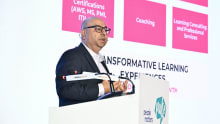Alessandro Giuliani on what it takes to make talent industry-ready

Alessandro Giuliani is the Managing Director of MISB Bocconi, world’s only offshore presence of the Università Bocconi. Located in Mumbai, MISB Bocconi offers Post-Graduate Programs in Business and Executive Education designed and taught by the faculty of SDA Bocconi, Milan, Italy.
In this special interview, Giuliani with his rich industry experience dwells on the state of business education and corporate affiliations in India.
Q.What according to you is the one big trend in the education sector viz. a viz. the job sector?
In the education sector, there is an increasing focus on soft-skills. While companies assess extracurricular activities as much as academics, they are also realizing that soft-skills (including team building skills, interpersonal skills and critical thinking skills)are a key success metric for scaling the corporate ladder, especially in a high-growth environment like India.
Q. Soft-skills are indeed critical to success. What is the right stage to inculcate soft skills?
If soft-skills and behavioral coaching can start way before a Master’s level, it will help identify people-potential early-on. I can say this because I have personally seen how the lack of soft skills education hampers people advancement. While it is painful to reject an intelligent person who cannot communicate effectively, the situation also poses a huge loss to the employer, who loses out on a talented employee.
Indians are exposed to the most diverse society that you can find in the world. They are adaptable by nature and know how to ‘jugaad’ in order to override challenges. However, the reality shows a gap in imparting formal training because of which they are not able to put this innate ability to practical use.
Corporate placement processes must be re-assessed to ensure that they do not turn only to the high percentile rankers
Q. What kind of opportunities do you offer to enable soft-skill development amongst your students?
MISB Bocconi has fine-tuned its Post Graduate program and we have increased our focus on what I call ‘soft subjects’ such as marketing, strategy and HR, which enable students to think critically. And we approach learning in a highly experiential and interactive teaching methodology we use case studies, group activities, projects, corporate interactions and we also have a soft-skills training program. To complement these skills with in-demand industry-fit soft-skills, there is also an 8-week graded summer internship program and a unique live-projects program, where students get to work on corporate projects. While interactions with foreign students and faculty give students a global perspective, such interactions also foster cross-cultural sensitivity by bringing together diverse mindsets. We turn to extracurricular activities to help our students enhance their behavioral competencies by participating in business competitions and hosting them.
Q. There is a lot of focus on data skills — employers want employees to know data sources and leverage data to make decisions. How is the education sector enabling this skill set?
Developing data skills is certainly more important now than ever. And I see India as the provider of good data analysts for the world. From an educational standpoint, most data-analytics courses on offer tackle the quantitative aspects such as number crunching and analysis but miss out on the business angle i.e. sourcing and understanding the correct data.
MISB Bocconi’s course on Business Analytics is ranked no. 4 in India (by Analytics Vidhya) and is seeing an increased demand. We have mapped the technical aspects of data with an industry perspective by roping in a dedicated faculty for Business Analytics.
Q. What is the role that educational institutions such as yours play in nurturing the curiosity for lifelong learning?
Nurturing curiosity is not easy. Educational institutions must plant the seeds of a continuous learning attitude. At MISB Bocconi, we try to inculcate a “love for learning” by curating industry-relevant courses. The short-term courses such as the one on business analytics are open to all students and we coach our students to identify the right course and faculty. Our focus is on making learning stimulating and interesting for students, only then can we expect them to develop a lifelong love for learning.
The (B-School Tier) system runs contrary to the well-rounded student experience that the industry is in dire need of
Q. What can institutions and employers do to avoid candidate renege?
This is an issue evolving from a mismatch between the student’s job expectations and reality. Most PGPBs or MBA candidates are obsessed with fancy-sounding designations in management consulting or investment banking. They are drawn to alluring packages, although they hardly know what the job or company is about. With corporate interactions, live projects and internships, we help students understand the finer aspects of a job, company culture, job profile, and leadership visibility. We make a concerted effort to make our students understand that it is not the package that is most important, but finding the correct person-job-company match is. We also conduct activities to help students relate their personality types with company personality by hiring certified trainers and using a color-coding system to define company culture. This activity has helped students to understand the variants of companies and how they fit in. After spending 9 months in the course, a good part of them change their mind about what job to select.
Q. Do you think there are any areas of improvement in the interface between industry and academia?
The HR world has received us very well. MISB Bocconi has received help from industry, whether it has to do with delivering guest lectures or absorbing students into live projects. As far as issues are concerned, most companies in India follow a rigid B-School Tier system. While I understand the necessity in India, which has so many B-Schools, the system runs contrary to the well-rounded student experience that the industry is in dire need of. Despite being a part of a rigorous and globally benchmarked course, students tend to miss out on Tier-1 companies because they are not all 99 percentilers. Corporate placement processes must be re-assessed to ensure that they do not take away from building industry-ready students by only turning to high percentile rankers.
Q. What is unique about MISB Bocconi’s vision? What are your hopes for the future?
We believe in bringing innovation to the table and creating unique opportunities. This year we launched a Women’s Leadership Scholarship, which mirrors the corporate philosophy of Diversity and Inclusion. Our approach to holistic development will pay off by building industry-ready talent, with global exposure being the key differentiator. We understand the need to continuously upgrade as per global standards, which is where the future of business success lies. We nurture an open mindset and equip our future industrialists with problem-solving capabilities across a wide spectrum. A global outlook, complemented by a keen understanding of local nuances must be the focus for a better business tomorrow.
MISB Bocconi, located in Mumbai, is the world’s only offshore presence of Università Bocconi, one of Europe’s premier universities. Founded in 2012, MISB Bocconi offers Post-Graduate program in Business and Executive Education, designed and taught by the faculty of SDA Bocconi, Milan, Italy
MISB Bocconi’s key differentiator lies in the wide-ranging practical and academic expertise of the SDA Bocconi faculty; pro-active learning pedagogies include industry interaction, job-oriented internships, and projects to prepare students for global leadership. International exposure is integral to the program through the dual campus student exchange between Milan and Mumbai.












